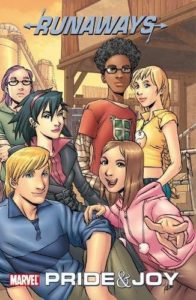Synopsis
At some point in their lives, all young people believe their parents are evil … but what if they really are? Meet Alex, Karolina, Gert, Chase, Molly and Nico — whose lives are about to take an unexpected turn. When these six young friends discover their parents are all secretly super-powered villains, the shocked teens find strength in one another. Together, they run away from home and straight into the adventure of their lives — vowing to turn the tables on their evil legacy.
Notes on This Title
This title is unrelated to Runaways: Battleworld. The focal characters of this series return in Runaways (2017), but the two titles can be read independently of one another.
Awards
2006 Harvey Award for Best Continuing or Limited Series
Reviews
“Marvel Age” is a line of manga-sized, full-color paperbacks aimed at manga fans. This, the best of the line’s initial releases (which also include the worthwhile Sentinel and is Spider-Girl and the inferior Marvel Age Spider-Man), is the story of six kids, aged 11 to 16, who discover that their parents are part of a villainous secret society called the Pride. After witnessing a Pride ritual involving human sacrifice, the kids decide to investigate, and they discover many secrets that their parents have been hiding. One of the kids is actually an alien, one’s a mutant, one’s a witch–and one gains a dinosaur from the future as a protector. The smart script by Vaughan (Y the Last Man) gives the kids believably natural dialog and distinct personalities. Adrian Alphona’s cartoonlike, manga inflected art looks good despite being shrunk down from its original larger size. In a departure, Marvel gives this hook a specific age rating, 12 and up. Excellent for teens, but adult superhero fans will also enjoy.” (Source: Library Journal. 129.14 (Sept. 1, 2004): p129)
“This unusually clever, fun teen comic is based on the novel premise that parents don’t just seem evil, they actually are evil supervillains. Or so some kids find out one night while eavesdropping on a dastardly meeting they take to be a cocktail party. Although the children are each a “type” right out of sitcom land—the goth girl, the brain, the jock, the dreamboat, the shy one—they’re also fairly empathetic characters. Vaughan’s closely observed dialogue lends them authenticity and pathos as they go through the disturbing realization that their parents aren’t just jerks but actually mass-murderers. The plot builds from this initial discovery, as the kids band together, discover they, too, have superhuman powers and engage their parents in good, old-fashioned superhuman fisticuffs. The group goes on the run and discovers their parents have all of Los Angeles in their pockets—it’s enough to make a teenager feel more alienated than ever. Alphona’s dynamic, manga-influenced artwork agreeably complements Vaughan’s crisp writing. They tell the story with clarity, a dollop of drama and just enough pizzazz to hook video game–obsessed readers. Packaged in a manga-size paperback, Marvel’s attempt to tap both the manga and the young adult market nicely succeeds.” (Source: Publishers Weekly)
Interviews
Hollywood Reporter: “Brian K. Vaughan on TV’s Comic Book Evolution and Why ‘Y: The Last Man’ Is More Relevant Than Ever“
